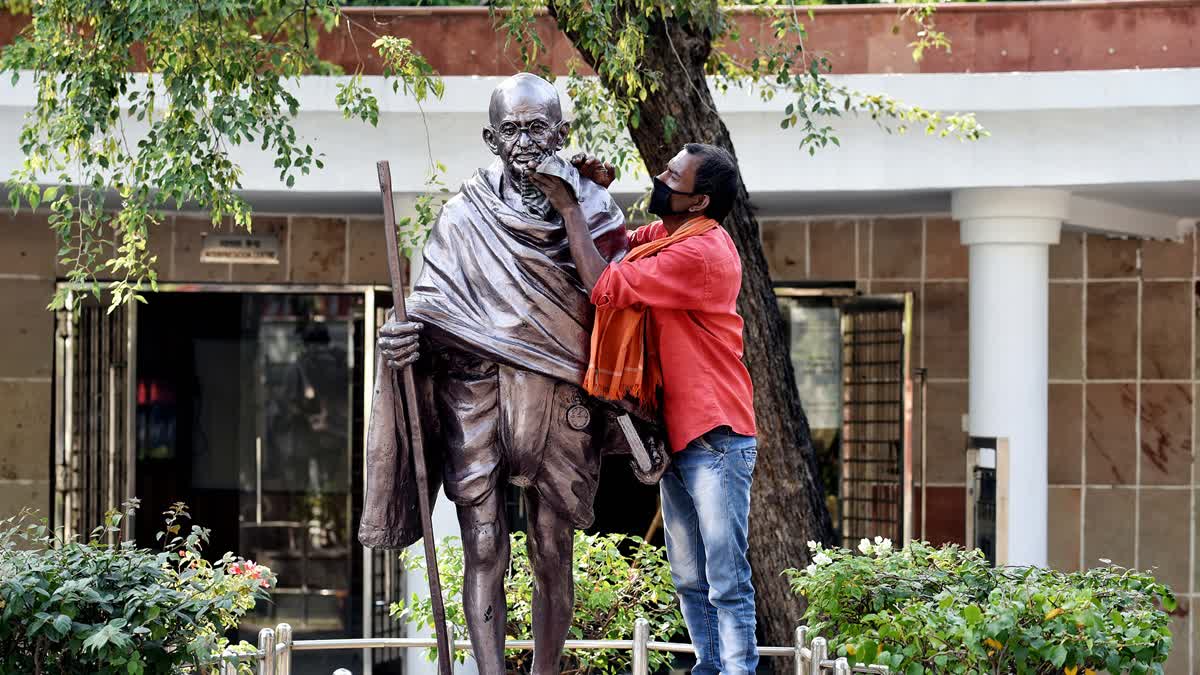Hyderabad:Gandhi Jayanti is being celebrated on October 2 to commemorate the birth anniversary of Mohandas Karamchand Gandhi, who went on to be lovingly called as Mahatma Gandhi.
Gandhi was born on October 2, 1869, in Porbandar, Gujarat. India observes Gandhi Jayanti as a national holiday each year to honor him for his service to the country. Besides, India also observes National Anti-Drug Addiction Day and the International Day of Non-Violence in remembrance of Mahatma Gandhi.
The Indian government has named various schemes and Projects after Mahatma Gandhi. Different states of India and the Central government are taking major decisions to implement certain restrictions on this day, like smoking ban, plastic ban, liquor ban, meat ban etc besides the Swachhta mission and launching different schemes to honour the Mahatma.
Days to Honour Mahatma Gandhi
International Day Of Non-Violence day:The International Day of Non-Violence is observed on 2 October, the birthday of Mahatma Gandhi, leader of the Indian independence movement and pioneer of the philosophy and strategy of non-violence. According to General Assembly resolution A/RES/61/271 of 15 June 2007, which established the commemoration, the International Day is an occasion to "disseminate the message of non-violence, including through education and public awareness". The resolution reaffirms "the universal relevance of the principle of non-violence" and the desire "to secure a culture of peace, tolerance, understanding and non-violence".
National Anti Drug Addiction Day:October 2 is also observed as Anti Drug Addiction Day at the national level. October 2nd is observed as Anti Drug Addiction Day across the country as a mark of respect to Mahatma Gandhi who fought against drug addiction during his lifetime. October 2nd is Gandhiji's birthday.The aim of observing this day is to make India free from drug abuse and addiction.
World Farm Animals Day:started in honor of Mahatma Gandhi, focuses on raising awareness about the poor treatment of farm animals and aims to improve their living conditions. World Farm Animals Day, celebrated on October 2nd, to honor the birthday of Mahatma Gandhi, and his teachings, focusing on promoting respect for animals and opposing cruelty. This day, starting in 1983, aims to remember the countless animals harmed, end cruel farming, and encourage vegan living.
Dry Day: As the nation remembers Mahatma Gandhi on his birth anniversary, the government also tries to implement the vision of the Father of the Nation. One such measure is the prohibition of alcohol on Gandhi Jayanti (Dry Day). All approved establishments, bars, hotels, liquor stores, wholesalers, and even casinos are not allowed to sell alcohol starting on October 2. For many years, the government has adhered to the dry day policy.
Schemes And Projects Named After Mahatma Gandhi
Mahatma Gandhi National Rural Employment Guarantee Act (MNREGA) – Mahatma Gandhi National Rural Employment Guarantee Act (MGNREGA) is an Indian labour law and social security measure that aims to guarantee the right to work. Launched on February 2 2006, UPA's flagship scheme aims to enhance livelihood security in rural areas by providing at least 100 days of wage employment in a financial year to every household whose adult members volunteer to do unskilled manual work.
Swachh Bharat Abhiyan -is a nation-wide campaign started on October 2, 2014 by Prime Minister Narendra Modi. The movement aims to clean up the streets, roads and infrastructure of India's cities, smaller towns, and rural areas. The objectives of Swachh Bharat include eliminating open defecation through the construction of household-owned and community-owned toilets and establishing an accountable mechanism of monitoring toilet use. The mission was to achieve an Open-Defecation Free (ODF) India by the 150th anniversary of the birth of Mahatma Gandhi, by constructing 90 million toilets in rural India.
Gandhi Smriti and Darshan Samiti -is one of the institutions formed by the government of India in September 1984 by the merger of Gandhi Darshan at Rajghat and Gandhi Smriti. It is one of the biggest museums of Gandhi and has a library where around 60,000 books are kept and has bookshops selling books of Gandhi. There are around 6000 original photos of Gandhi preserved here. The house treasures many memories of the last 144 days of Gandhi’s life.
Gandhi Shilp Bazaar -is a govt's scheme to promote and Market Indian handicrafts and provide financial assistance to different eligible organizations to organize Crafts Bazar in various places. It provides a direct marketing platform to poor and small artisans from various parts of the country and enables people of that area to source their requirements through these bazaars.
The Bunkar Bima Yojana -was introduced by the Government of India in December, 2003. From 2005-06 this scheme was revised and has been implemented with the title “Mahatma Gandhi Bunkar Yojana”. The basic objective of the „Mahatma Gandhi Bunkar Bima Yojana‟ is to provide enhanced insurance cover to the handloom weavers in the case of natural as well as accidental death and in cases of total or partial disability.
Mahatma Gandhi Pravasi Suraksha Yojana -is a special social security scheme which includes Pension and Life Insurance. It was introduced by the Ministry of Overseas Indian Affairs for the overseas Indian workers in possession of Emigration Check Required (ECR) passports. It is a voluntary scheme designed to help workers to meet their three financial needs: saving for retirement, saving for their return and resettlement, and providing free life insurance offering coverage for death from natural causes.
Gandhi Memorial International School (GMIS) -is a private international school in Kemayoran, Jakarta, Indonesia. It was established in 1950 along with Gandhi School Ancol. The students of grades preschool to 12 relocated to a new campus in Kemayoran (Central Jakarta) in 2004.
The Gandhi Peace Award -is an award and cash prize presented annually since 1960 by Promoting Enduring Peace to individuals for "contributions made in the promotion of international peace and good will." It is named in honor of Mohandas Karamchand Gandhi[1] but has no personal connection to Mohandas Gandhi or any member of his family.
